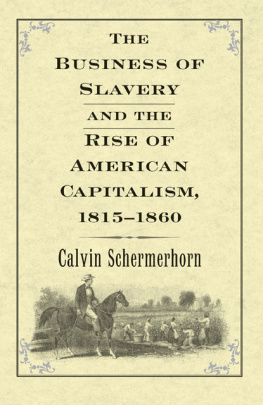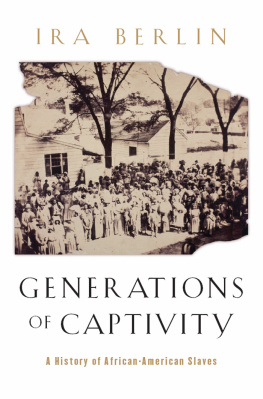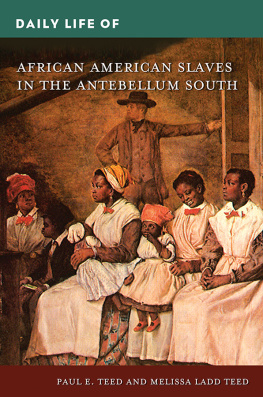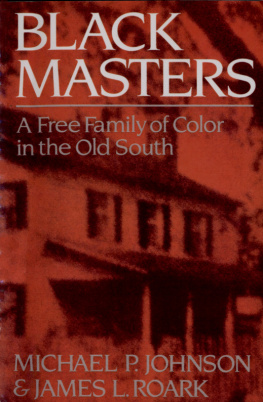Money over Mastery, Family over Freedom
STUDIES IN EARLY AMERICAN ECONOMY AND SOCIETY FROM THE LIBRARY COMPANY OF PHILADELPHIA
Cathy Matson, Series Editor
Money over Mastery, Family over Freedom
Slavery in the Antebellum Upper South

Calvin Schermerhorn

2011 The Johns Hopkins University Press
All rights reserved. Published 2011
Printed in the United States of America on acid-free paper
9 8 7 6 5 4 3 2 1
The Johns Hopkins University Press
2715 North Charles Street
Baltimore, Maryland 21218-4363
www.press.jhu.edu
Library of Congress Cataloging-in-publication Data
Schermerhorn, Calvin, 1975
Money over mastery, family over freedom : slavery in the antebellum upper South / Calvin Schermerhorn.
p. cm. (Studies in early American economy and society)
Includes bibliographical references and index.
ISBN-13: 978-1-4214-0035-8 (hardcover : alk. paper)
ISBN-13: 978-1-4214-0036-5 (pbk. : alk. paper)
ISBN-10: 1-4214-0035-9 (hardcover : alk. paper)
ISBN-10: 1-4214-0036-7 (pbk. : alk. paper)
1. SlaveryChesapeake Bay Region (Md. and Va.)History19th century.
2. SlaveryEconomic aspectsChesapeake Bay Region (Md. and Va.)History19th century. 3. SlavesFamily relationshipsChesapeake Bay Region (Md. and Va.)History19th century. 4. Slave tradeChesapeake Bay Region (Md. and Va.)History19th century. 5. Slave tradeSouthern StatesHistory19th century. 6. African American familiesChesapeake Bay Region (Md. and Va.)Social conditionsHistory19th century. 7. plantation lifeChesapeake Bay Region (Md. and Va.)History19th century. I. Title.
E445.M3S45 2011
975.51803dc22 2010046799
A catalog record for this book is available from the British Library.
Special discounts are available for bulk purchases of this book. For more information, please contact Special Sales at 410-516-6936 or .
The Johns Hopkins university press uses environmentally friendly book materials, including recycled text paper that is composed of at least 30 percent post-consumer waste, whenever possible. All of our book papers are acid-free, and our jackets and covers are printed on paper with recycled content.
Contents
Series Editors Foreword
In this new title in Studies in Early American Economy and Society, a collaborative enterprise between the Johns Hopkins university press and the Library Company of philadelphias program in Early American Economy and Society (PEAES), Calvin Schermerhorn explores North Americas oldest reproducing slave society. Money over Mastery, Family over Freedom: Slavery in the Antebellum Upper South explores how slave families in the region coped with the brutal reality of sale and forced migration into the developing cotton and sugar regions in the South and Southwest.
Having been part of an economic culture that for generations had incorporated the skilled and agricultural labor of slaves into both plantation development and wage-paying enterprises, slaves in the Chesapeake and coastal North Carolina were familiar with nonplantation markets as well as the power of masters to command their labor at will, on and off plantations. In post-Revolutionary America, slaves continued to play a crucial role in the booming interregional and international markets for cotton and sugar. However, slaves rarely were able to take control over their individual or collective economic destinies, and when Chesapeake planters began to sell large numbers of their slaves into the great maws of King Cotton and sugar production, they made manifest their power in slaves lives. Schermerhorn finds that when they were sent into the breach of forced migrations, slaves struggled mightily to protect vulnerable kin from sales that tore families apart by using the very market that sought to separate them.
Slaves could do so by various means. Most importantly, Schermerhorn argues, rather than resist outright the system of slavery, many slaves grasped at opportunities to preserve and expand families. Great numbers of slave families incorporated nonblood kin, which provided a shelter against forced sales for myriad individuals. Slaves also cultivated networks of patrons and informal allies who could help keep kin out of slave markets. Female slaves became wives and companions to slave traders to shield themselves and their kin from innumerable brutalities. Slaves of all occupational backgrounds accumulated small property, rented relatives, or purchased family members with credit in order to prevent forced separations.
Time after time, slaves who were confronted with the unthinkable departure of loved ones used various strategies to preserve family under slavery. As Schermerhorn reveals, slaves consistently chose to muster resources to protect family rather than to flee toward individual freedom. Slave families in the Chesapeake forged relationships, sometimes fleeting ones, with slaveholders, slave traders, employers, and sympathetic white people in cash and wage economies, which amounted to their making strategic decisions to compromise with the slave market in order to preserve families, as defined and shaped by slaves, from the horrors of forced separations. As a result, slaves own agency in the revitalization of the Chesapeake and coastal North Carolina during the early republic years, which served the interests of masters and internal improvers, became a source of strength and means of endurance for slave families.
Schermerhorns meticulously researched and intelligently argued study is admirably suited to the ongoing efforts of PEAES to reach across scholarly disciplines and methodologies and to promote discussion of the early American economy in the broadest terms possible.
Cathy Matson
Professor of History, University of Delaware
Director, Program in Early American Economy and Society,
Library Company of Philadelphia

Money over Mastery, Family over Freedom
Prologue
American slavery was an intricate dance between forced labor and the forces of modernity. This book explores the redevelopment of the coastal region of the upper South from the turn of the nineteenth century to the beginning of the Civil War through the lives of the enslaved people who built it. The enslaved men and women whose life dramas populate the following pages were put to work building the future of the region and with it the future of slavery. The men, women, and children enslaved in the early American republic participated in one of the largest forced migrations in modern history, one that supplied the workforce that underwrote agricultural revolutions in the lower south of an expanding continental empire. In the Chesapeake and coastal North Carolina, new employments for enslaved people in growing urban areas and in transportation trades held out opportunities for them to develop strategies to keep vulnerable family members out of the coffles into which their friends and relatives regularly disappeared. With tragic irony, enslaved people sought to use the changing market that was responsible for slaverys new commercial vitality to defend themselves from market-made separations. Cotton and sugar exports From the point of view of the enslaved, changes in the American landscape looked very different than for slaveholders at the intersection of an expanding political nation and a far-flung network of customers hungry for slave-produced commodities. For the enslaved, any conception of bondage involving paternalistic ties between slaveholders and slaves crumbled under the weight of the reality that slaveholders broke up families for profit, not merely in the abstract, but literally. Instead of cotton or sugar, their children, sisters, and brothers were prime commodities. Consequently, their primary endeavor was to construct networks to protect families in the middle of one of the most destructive and sustained devaluations of kin and affinal bonds in the history of the modern world. For seventy years in the antebellum South, enslavers used the success of African American families and their reproduction as the fuel for a pair of modernization processes. They moved and sold enslaved people, especially young men and women, to the cotton and sugar frontiers, where enslavers, many of them members of white Maryland, Virginia, and North Carolina families, were creating an astonishingly dynamic zone of agricultural commodity production. At the same time, in the upper South itself, enslavers were modernizing what at the turn of the nineteenth century had been a superannuated plantation society. They were turning it into a diversified modern economy of varied commodity production, processing, transportation, and commerce. At the heart of those processes were African American families who struggled against the odds, using local economic transformations to keep loved ones from being bound away to the punishing fields of snowy lint and woody cane.
Next page







